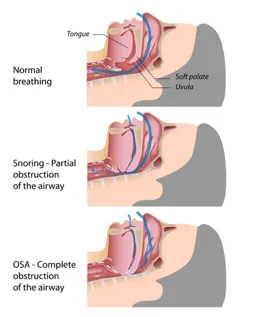You know what snoring is, right?
Snoring is noisy breathing during sleep. If you snore, you may experience poor quality sleep. If your partner snores, your sleep may be constantly interrupted. Either way, someone suffers.
You are at a greater risk of snoring if you are male or overweight, but snoring is common among all ages and both genders.
It affects approximately 90 million American adults, with 37 million of those snoring on regular basis. (1) The disruptions and lower quality of sleep resulting from snoring lead to daytime tiredness, sleepiness, and decreased productivity
- Normal aging and relaxation of the throat muscles
- Anatomical abnormalities - nasal polyps, deviated nasal septum, enlarged tonsils or adenoids
- Functional abnormalities - inflammation of the nose and/or throat from respiratory infection or allergy
- Sleep position
- Alcohol ingestion in the evening

What About Obstructive Sleep Apnea?
Obstructive Sleep Apnea (OSA) is defined as pauses (apneas) in breathing during sleep, due to blockage of the upper airway, and is accompanied by a drop in oxygen saturation.
People with obstructive sleep apnea are often not aware of their breathing problem until a sleeping partner or family member informs them of their episodic symptoms and abnormal breathing pattern during sleep. Generally, OSA is a serious medical condition that over time may have multiple negative effects on a person’s body and overall health, well-being, and quality of life. OSA negatively affects the health of tens of thousands of Americans every year.
Common symptoms of OSA can include:
- excessive daytime sleepiness
- waking repeatedly at night
- loud snoring
- intervals of silence during sleep followed by gasps
- jerking or restless legs during sleep
Less common symptoms can be unexplained weight gain, difficulty concentrating forgetfulness, diminished sex drive, alterations in mood like grouchiness, anxiety, or depression
These factors can increase your risk for OSA:
- the aging process
- being overweight
- regular use of chemical depressants (alcohol and sedative medications)
- family history of OSA
- smoking

While you sleep, the muscles of your throat relax, your tongue falls backward, and your throat becomes narrow and "floppy." When this happens, the walls of the throat vibrate with the airflow as you breathe. These vibrations lead to the characteristic sound of snoring.
If the walls of the throat collapse completely so that the throat is completely occluded, a condition called apnea (cessation of breathing) results. This is a serious condition that requires medical attention. About one-half of people who snore loudly have obstructive sleep apnea.(1)
What can I do about OSA?
Treatments for obstructive sleep apnea vary and depend on your particular situation and the severity of your condition, so the place to start is with an Ear Nose & Throat doctor who specializes in diagnosing and treating sleep apnea, like Dr. Trimble.
A combination of multiple treatment methods may be considered, including:
- Behavior Modifications
Losing weight, adjusting sleeping positions, quitting smoking, avoiding alcohol and sedative use.
- Oral Appliances
Designed to hold your jaw slightly down and forward to improve breathing.
- Continuous Positive Airway Pressure (CPAP)
Often the first line of treatment for OSA. It uses a system to deliver a steady, pressure-controlled amount of air to keep your airway open while you sleep.
- Additional Positive Pressure Delivery Systems
Variable positive airway pressure (VPAP), bilevel positive airway pressure (BiPAP), and automatic positive airway pressure (APAP)
- Surgical Intervention
When CPAP and other methods of treatment prove unsuccessful to treat your OSA.

Untreated OSA can lead to negative health impacts on your body. If left untreated, OSA can significantly increase your risks for
- heart disease
- high blood pressure
- stroke
- obesity
- depression
- diabetes
- premature death
- auto accidents
Obstructive sleep apnea is a serious condition that requires medical attention as soon as possible. Proper diagnosis, treatment, and management of OSA by a qualified Ear Nose & Throat specialist like Dr. Trimble can minimize or help you avoid serious health consequences as well as improve your quality of sleep and overall well-being.
What our patients are saying...
See More Patient ReviewsPlease Note: Every patient is unique, and your results may vary.
